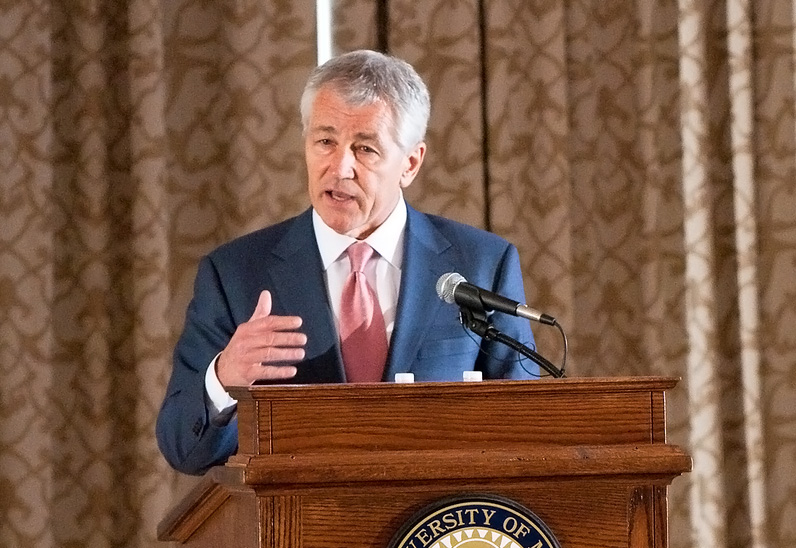One of America’s great soap operas is being performed live right now on Capitol Hill. It is scripted, predetermined, poorly acted, rarely interesting, predictable. Ladies and gents, the nomination hearings of Chuck Hagel to be secretary of defense.
Yesterday afternoon, we noted that Hagel, if OK’d by the Senate, will step down from his board position at Chevron. We suggested that this also meant Hagel would forget his years of fossil fuel advocacy, cleaning his slate on energy issues. Because that’s how it works.
Apparently, we were either right — or Hagel read and responded to our snark. Probably the latter. From The Hill:
Former Sen. Chuck Hagel (R-Neb.), President Obama’s nominee for Defense secretary, is backing a controversial ban on military purchase of alternative fuels that have higher greenhouse gas emissions than conventional oil-based fuels. …
Hagel also backs military programs to expand use of biofuels in defense operations, but he argues large-scale use should only occur when the fuels are cost-competitive.
We’ll parse this out. The first paragraph above relates to a ban authored by Rep. Henry Waxman (D-Calif.), meant to limit Defense Department investment in alternative fuels that — from extraction to refinery to combustion — create more climate pollution than conventional fuels. The targets of this measure are fuels like liquefied coal or tar-sands-based diesel. Hagel opposes using those fuels.
The second part is trickier. There’s been an ongoing debate over the role of biofuels in the military. The Navy in particular has embraced biofuels enthusiastically, recognizing that renewable, domestic sources of fuel provide a long-term tactical advantage. Allies of fossil fuels on the Hill — like Sen. James Inhofe (R-Okla.) — suggest that such investment is a bad idea. Their primary argument is that biofuels are more expensive to purchase, allowing opponents of their use to make standard oh-my-gosh-the-federal-debt arguments against them.
In responding to written questions from the Senate Armed Services Committee, Hagel wrote: “It is prudent for the department to engage in tests and demonstrations that confirm defense equipment can operate on a range of fuels.” The Navy is exploring how to use biofuels in part to figure out how to make the costs work over the long term, which means spending more now to have fuels with which to experiment. Hagel’s answer suggests that he supports a continuation of that practice.
As Politico notes, energy and climate may not come up during Hagel’s confirmation hearings.
“Compared with … things like Iran, Israel policy, defense sequester, any number of other things, I would say this is probably further down the totem pole than all of those,” Andrew Holland, a former Hagel energy aide now with the American Security Project, tells [Politico]. “I’d be surprised if there’s a lot of questioning about this.”
So we’ll keep our fingers crossed, hoping that the soon-to-be-former Chevron board member who is dumping his stock due, in part, to the company’s contracts with the government will advocate for a robust exploration of non-fossil-fuel-reliant military options. We’d ask a question about it at the hearings if given the opportunity, but we’re not cast members in this particular show.
Update: During today’s hearing, Sen. Mazie Hirono (D-Hawaii) asked about investment in alternative fuels. Hagel repeated that he thought researching such fuels made sense, but also echoed concerns about cost. In other words: nothing new.




